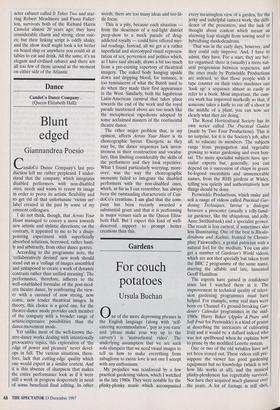Dance
CandoCo Dance Company. (Queen Elizabeth Hall)
Blunt edged
Giannandrea Poem
CandoC,o Dance Company's last pro- duction left me rather perplexed. I under- stand that the company, which integrates disabled performers with non-disabled ones, needs and wants to renew its image in order to prove its artistic flexibility and to get rid of that unfortunate 'victim art' label created in the past by some of my eminent colleagues.
I do not think, though, that Across Your Heart managed to convey a move towards new artistic and stylistic directions; on the contrary, it appeared to me to be a disap- pointing experiment with superficially absorbed solutions, borrowed, rather hasti- ly and arbitrarily, from other dance genres.
According to the programme note, the 'collaboratively devised' new work should stand out as a 'collage of images assembled and juxtaposed to create a work of dynamic, contrasts rather than unified meaning'. The performance, therefore, adheres to the well-established formulae of the post-mod- ern theatre dance, by confronting the view- er with a carousel of now strong, now comic, now tender theatrical images. In theory, this choice is a good one, for the theatre-dance mode provides each member of the company with a broader range of artistic/expressive possibilities than the dance/movement mode.
Yet unlike most of the well-known the- atre-dance works dealing with intentionally provocative topics, this exploration of 'the edge of power and pleasure' never devel- ops in full. The various situations, there- fore, lack that cutting-edge quality which one would expect in a similar context. And it is this absence of sharpness that makes the entire performance look as if it were still a work in progress desperately in need of some beneficial final editing. In other words, there are too many ideas and too lit- tle focus.
This is a pity, because each situation — from the sleaziness of a red-light district peep-show to a mock parade of drug- addicted royalty — could have offered myr- iad readings. Instead, all we get is a rather superficial and stereotyped visual represen- tation of sex, perversion and politics which, as I have said already, draws a bit too much from a pre-existing repertory of theatrical imagery. The naked body hanging upside down and dripping blood, for instance, is too reminiscent of what the Butoh used to do when they made their first appearance in the West. Similarly, both the lugubrious Latin-American carnival that takes place towards the end of the work and the royal parade mentioned above are too much like the metaphorical expedients adopted by some acclaimed masters of the continental theatre dance.
The other major problem that, in my opinion, affects Across Your Heart is its choreographic layout. Energetic as they may be, the dance sequences lack inven- tiveness in their construction and vocabu- lary, thus limiting considerably the skills of the performers and they look repetitive. What I found particularly worrying, more- over, was the way the choreographic moments failed to integrate the disabled performers with the non-disabled ones, which, as far as I can remember, has always been the outstanding characteristic of Can- doCo's creations. I am glad that the com- pany has been recently awarded a substantial grant and that it is performing in major venues such as the Queen Eliza- beth Hall. But I expect this kind of well- deserved support to prompt better creations than this.


















































































 Previous page
Previous page